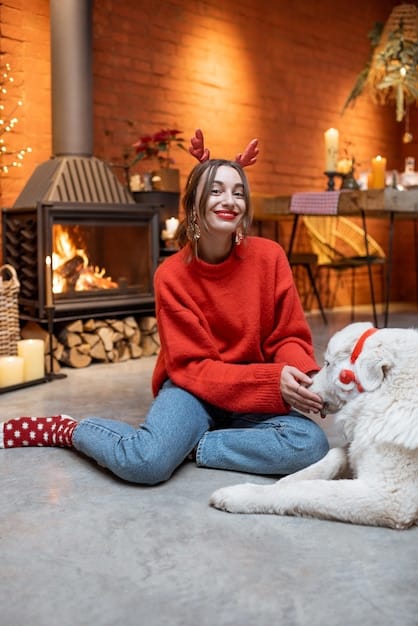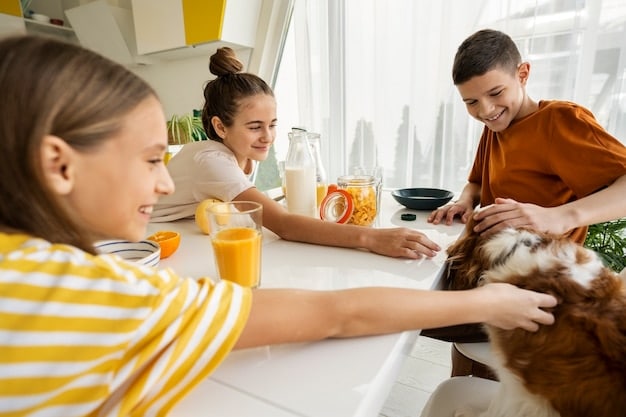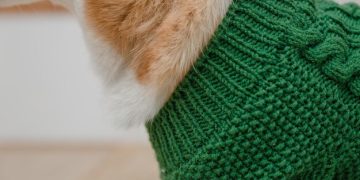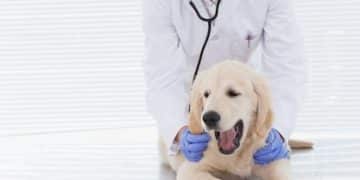Prepare Your Pet for the Holidays: Practical Solutions & Tips

Anúncios
Preparing your pet for the holiday season involves understanding potential stressors like loud noises and changes in routine, providing safe spaces, maintaining their schedule as much as possible, and being mindful of holiday foods and decorations that can be harmful.
The holiday season is a time of cheer and celebration for many, but it can be a stressful and even dangerous period for our beloved pets. With bustling gatherings, unfamiliar faces, loud noises, and tempting treats, preparing your pet for the upcoming holiday season is crucial for their safety and well-being.
Anúncios
Understanding Holiday Stressors for Pets
The holidays bring a flurry of changes to your pet’s environment and routine, which can lead to anxiety and stress. Identifying these potential stressors is the first step in creating a more comfortable holiday season for your furry friend.
Loud Noises and Decorations
Fireworks, parties, and even cheerful holiday music can be overwhelming for pets with sensitive hearing. In addition, new decorations can be unsettling and even pose a safety hazard if ingested. Here are some things that might distress them:
Anúncios
- Sudden loud noises like popping balloons or fireworks.
- Unfamiliar decorations, especially those that move or make noise.
- The increased number of people entering and leaving the house.
Changes in Routine
The holidays often disrupt your pet’s normal schedule, including feeding times, walks, and playtime. Lack of routine can cause anxiety and behavioral changes. They thrive on routine and knowing they can count on consistant schedules.

Creating a Safe and Comfortable Environment
Providing a safe and comfortable environment is paramount to helping your pet navigate the holiday season with minimal stress. A designated safe space can be their personal haven during chaotic times.
Designated Safe Space
Designate a quiet, comfortable space where your pet can retreat when feeling overwhelmed. This could be a crate, a spare room, or even a cozy corner in a familiar area. Stock it with their favorite toys, blankets, and water.
Minimizing Exposure to Stressors
Reduce their exposure to potential stressors by keeping them away from loud parties or fireworks displays. If guests are visiting, ensure they understand your pet’s boundaries and avoid forcing interaction.
- Keep pets indoors during fireworks displays.
- Use calming aids like pheromone diffusers or calming treats.
- Provide background noise, like a TV or soft music, to mask sudden loud sounds.
Consider using calming aids such as thunder shirts, calming treats or pheromone diffusers to help reduce anxiety. These can provide a sense of security and comfort during stressful times.
Managing Holiday Treats and Food Safety
The holidays are synonymous with delicious food, but many traditional holiday treats are hazardous to pets. Educate yourself on what is safe and unsafe, and take precautions to prevent accidental ingestion.
Hazardous Holiday Foods
Keep holiday foods out of reach, especially chocolate, grapes, raisins, onions, garlic, and foods containing artificial sweeteners like xylitol. Also, be wary of bones, which can splinter and cause internal damage. Secure trash cans to prevent pets from scavenging.
Safe Treat Alternatives
Offer your pets safe and healthy alternatives to holiday treats. Carrots, sweet potatoes, and green beans can be great options in moderation. Always consult with your veterinarian before introducing new foods to your pet’s diet.

Maintaining a Regular Routine
Sticking to your pet’s regular routine as much as possible can provide a sense of normalcy and security during the holiday season. Consistent feeding times, walks, and playtime can minimize stress and anxiety.
Consistent Feeding and Exercise
Maintain consistent feeding schedules and ensure your pet gets regular exercise. This can help them burn off excess energy and reduce anxiety. Even a short walk or play session can make a big difference.
Predictable Schedule
Try to maintain a predictable schedule for walks, playtime, and bedtime. This predictability can help your pet feel more secure and less anxious amidst the holiday chaos. Even small routines can provide comfort.
- Set specific times for walks and stick to them.
- Continue regular playtime sessions to burn off energy.
- Maintain consistent feeding times to avoid digestive upset.
Preparing for Holiday Travel
If you’re planning to travel during the holidays, it’s essential to prepare your pet for the journey. Whether traveling by car or plane, proper planning ensures a safe and stress-free trip for everyone involved.
Pet-Friendly Travel Arrangements
If traveling by car, secure your pet in a crate or with a pet seatbelt. Make frequent stops for bathroom breaks and ensure they have access to water. For air travel, check airline regulations and ensure your pet’s carrier meets requirements. Make sure your pet has current identification and vaccination records.
Comfort Items for Travel
Bring along familiar items like a favorite blanket or toy to provide comfort and familiarity during travel. These items can help reduce anxiety and create a sense of security in unfamiliar surroundings. Consider using pheromone sprays in the carrier to promote relaxation. Don’t give your pet human medications without the express direction of your vet.
Educating Holiday Guests
A crucial part of pet-proofing the holidays is ensuring your guests know how to interact safely and respectfully with your animal companion. Clear communication prevents accidental mishaps and keeps everyone happy.
Setting ground rules
Before guests arrive, politely communicate any ground rules about interacting with your pet. This can include instructions not to feed them table scraps, to avoid startling them, or to respect their space when they retreat to their safe zone. When guests arrive it might also be helpful to put up signs or have small cards they can read.
Supervised Interaction
Especially with children, supervise interactions between your pet and guests. Emphasize gentle handling and respect for your animal’s boundaries. Be ready to intervene if your pet appears uncomfortable or overwhelmed.
By understanding potential holiday stressors, creating a secure environment, managing food safety, maintaining routine, and preparing for travel, you can ensure your pet enjoys a happy and stress-free holiday season. A little preparation goes a long way in providing a safe and comfortable holiday for your furry companion.
| Key Point | Brief Description |
|---|---|
| 🎉 Safe Space | Designate a quiet area with toys/blankets for your pet. |
| 🍖 Food Safety | Avoid chocolate, grapes, and onions; offer safe treats. |
| 📅 Routine | Maintain feeding/walk schedules for stability. |
| ✈️ Travel Prep | Secure pet in car/carrier; bring comfort items. |
FAQ Section
▼
Signs of stress in pets include panting, pacing, hiding, excessive vocalization, changes in appetite, and unusual aggression. If you notice these signs, provide a safe space and minimize exposure to stressors.
▼
Safe calming aids include pheromone diffusers, calming treats (containing ingredients like L-theanine or chamomile), and anxiety vests (like ThunderShirts). Always consult with your veterinarian before using any new calming aid.
▼
No, never give your pet human medication without consulting with your veterinarian. Many human medications are toxic to pets. Your vet can prescribe safe and effective medications or calming aids specifically for pets.
▼
Keep decorations out of reach or in areas where your pet cannot access them. Secure Christmas trees to prevent them from falling, and avoid using tinsel, ribbons, or ornaments that could be ingested.
▼
If you suspect your pet has ingested something toxic, contact your veterinarian or the ASPCA Animal Poison Control Center immediately. Prompt action can significantly improve the outcome.
Conclusion
In conclusion, preparing your pet for the holiday season requires foresight, understanding, and a proactive approach to their well-being. By creating a safe and comfortable environment, managing food safety, and maintaining routine, you can ensure your furry friend enjoys a happy and stress-free holiday alongside you and your loved ones.






